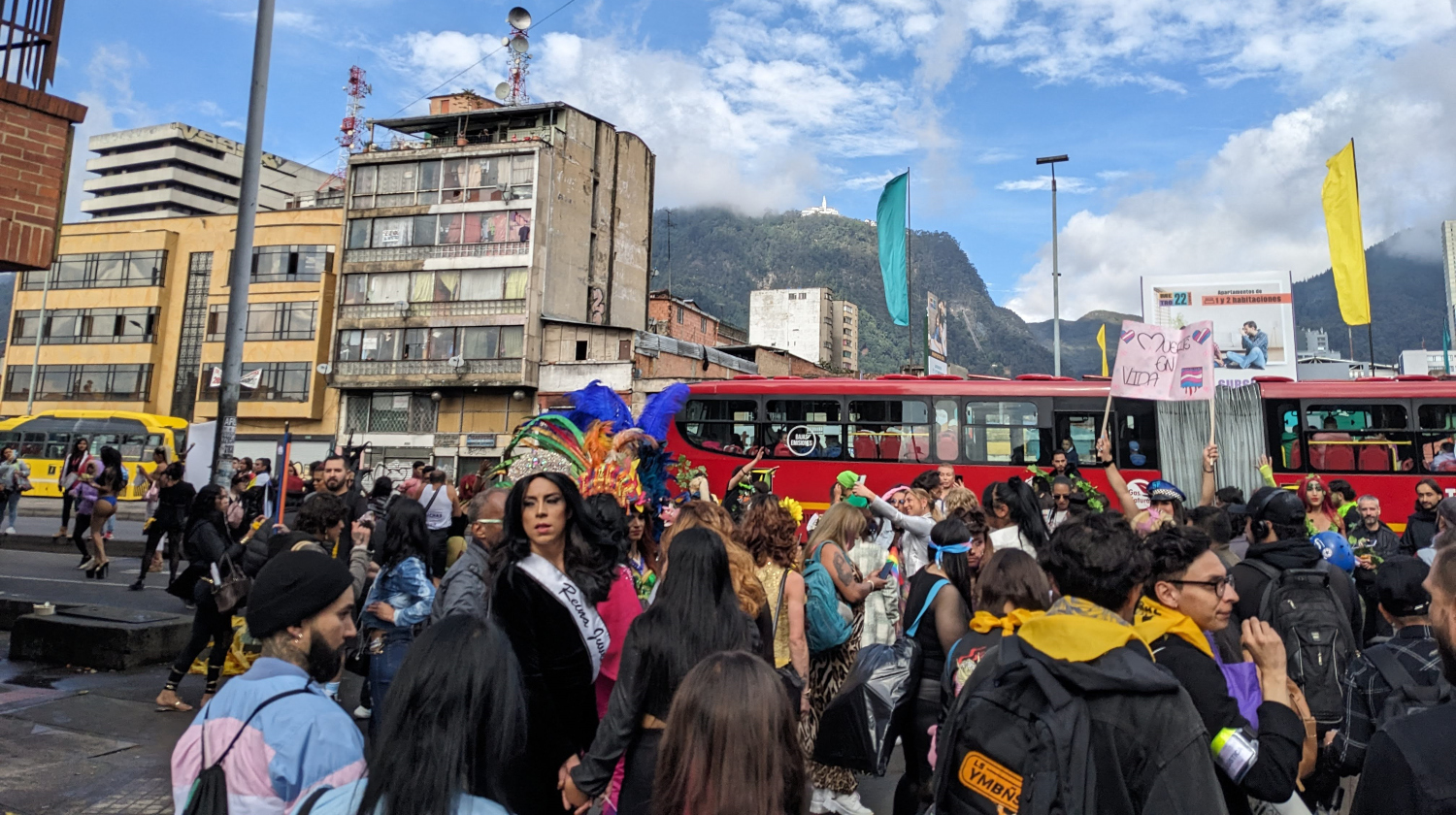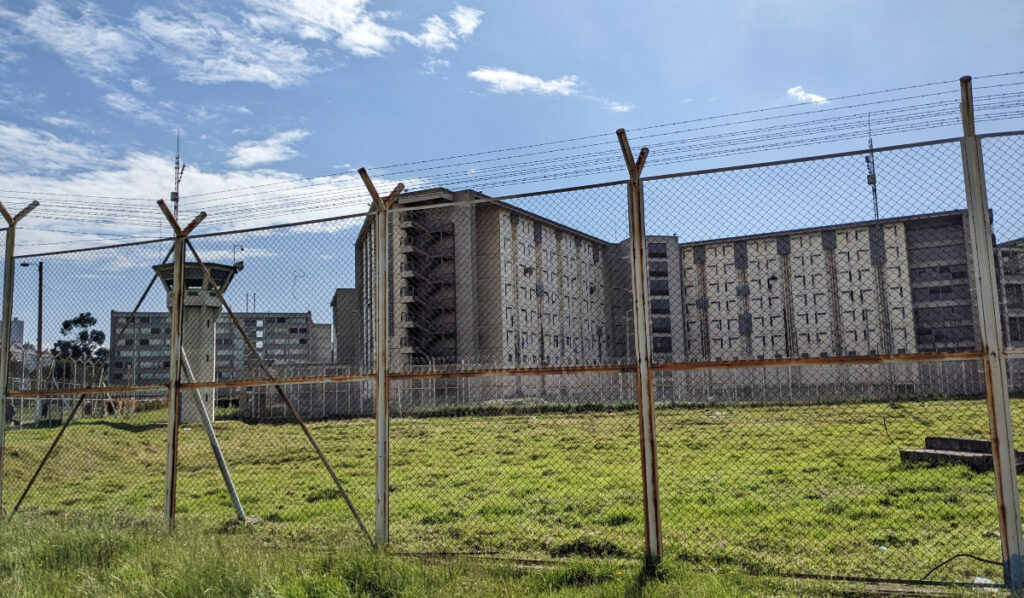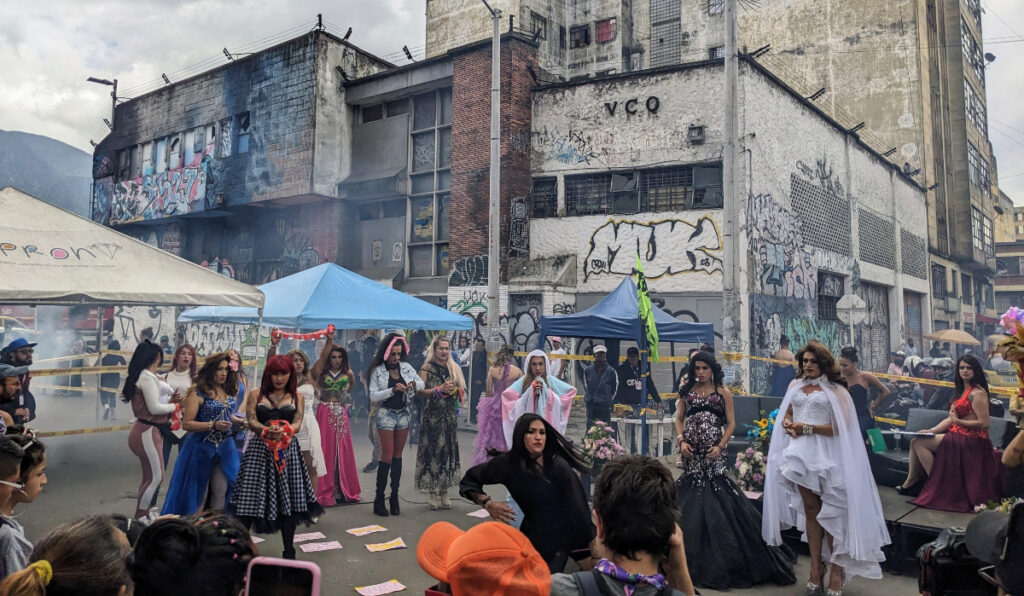Una Soledad Acompañada: Trans Care, Study, and Opacity in Colombian Prison Worlds
Joe Hiller
6 December 2023This research probes the problem of care for trans people in Colombian prison worlds, especially the role of study as care. Care is often a site of untidy contestation, of suspicion, resentment, and silence alongside generosity, compassion, and trust. How do we act when others’ realities are not ours, but we seek to fight for and with them regardless?

Laura is divine in a short black dress with shoulders and bell sleeves of black lace, her wide necklace suspending a design of interlocking circles above her breastbone. Her shoes—thick-soled boots—are white, as is her watch. Guards in blue camo flank her as she descends from the prison van and enters the cinema. They carry long guns. She wears eyeglasses.
Laura is the trans woman with the longest prison sentence in Latin America: more than 50 years. She has been granted special leave to attend the domestic premiere of a documentary, Transfariana, about her relationship with a leader of the FARC (Revolutionary Armed Forces of Colombia), a man she met while they were both behind bars. I know from earlier conversations with her that she felt deeply conflicted about attending this event. The pain of being forced to return to prison, she feared, would outweigh the fleeting release of being in the movie theater.
But in the end here she is. Her friends—formerly incarcerated trans women who organize the Imprisoned Bodies, Active Minds project—bring her lunch over the protestations of film festival staff. No food is allowed in the theater, they clamor, but Laura’s companions won’t let her go hungry. Prison meals are wretched; they bought her crepes, a dessert, a bright mango smoothie. Small treats before the prison gates close behind her again.
The documentary covers a period of five years. In it, a younger Laura expresses her decision to represent herself in her case’s appeals process. “I was the one who lived this ordeal,” she explains, resolute. “I lived through this injustice. I’ve suffered it in the flesh. So I think I’m the only one who can understand it. What’s important to me. I’m the one who understands it. Perhaps certain people feel emotionally hurt by what I’m saying, but it’s over. I’m the one who’s in here.”

After the screening, however, as she speaks on a panel, she chuckles at herself. “Seeing how I was back then, it makes me recognize how we never stop changing, how we’re permanently evolving beings.” She went on, “I believe loneliness is part of everyone’s existence…even when you know you have people who love you, you still feel a deep lonesomeness, because what you’ve been through, the suffering that comes with the experiences that mark our lives, only we can feel that…You can express yourself, you can search for the words to name your pain, but nobody will understand…Yet despite feeling this enormous solitude, I adore knowing that I am surrounded by people who support me, who hold me up when I don’t have the strength to stand. Truly, I’m learning—knowing—that la soledad es acompañada (loneliness is accompanied).” As she spoke, the dark theatre echoed with shouts of affirmation:“¡Te amamos Laura!” “We love you Laura!”
This dissertation chapter-in-progress emerges from the contradictions Laura articulates, between loneliness and accompaniment, love and unknowability, singularity and community. I focus on the problem of care for trans people in Colombian prison worlds, especially the role of study as care, or as its inverse, as betrayal or extraction. How do we act when others’ realities are not ours, but we seek to fight for and with them regardless?
I write prison “worlds” because the technologies and ramifications of incarceration exceed prison walls, acutely so for trans people. The “problem” is that it is not transparent what kinds of care criminalized trans people need, who is fit to provide that care, or how the effectiveness of this care should be evaluated. I consider two facets to this problem. The first has to do with the production of knowledge about trans experiences with the justice system. Who should tell trans stories, and how? What stories need to be told, and what stories are told too much? What should trans people receive in exchange for their testimonies? The second has to do with care in the sense of keeping trans people alive in the here and now, addressing immediate needs and vulnerabilities. And more than survival: asking, as historian Hil Malatino does, “what practices of care might ensure trans flourishing?” (One obvious conclusion I can assert here: the prison is anathema to trans flourishing.)

In my encounters in Colombian prison worlds, care was often a site of untidy contestation, of suspicion, resentment, and silence alongside generosity, compassion, and trust. Trans people in and out of prison have been subjected to structures of vigilant attention that posture as concern but result, in Malatino’s expression, in “forms of hypervisibility that wear us [trans people] out, that cultivate hyperalertness and anxiety.”
Academic and legal studies of trans people have been complicit with these processes. As part of my doctoral research, I partnered with an elite Colombian law school clinic for an investigative project into trans experiences with the police, courts, and prisons. We hoped to generate knowledge that could improve trans lives. Laura and others saw this effort differently, as a recapitulation of extractive processes, of uncaring taking without reciprocal giving. What is the use of studying us, they asked? We have been studied before, ad nauseum, without it making life smoother or easier, without it changing structural inequalities and exclusions. What else can you offer? Most of the trans people the project approached declined to collaborate.
In my longer work, I consider these (dis)engagements through dialogue with theories of opacity, refusal, fugitivity, and quiet. Black studies and native studies offer key terms to reckon with how trans people express their dissatisfaction with the positions offered to them by normative research projects, even when those projects are well-intentioned, and address pressing need.
Because the urgency is real: the context for this research is that in Colombia, even though social movements have accomplished changes in the law, criminalized trans people remain bereft of care. State responses to the needs of trans people are unevenly realized, inadequate, and in the best of situations, impersonal and distanced, aligned with what anthropologist Lisa Stevenson names “anonymous care.” Laura and others like her live in situations of precarity and danger. The question remains what to do, how to struggle for something like justice. This work-in-progress traces how Colombian trans people and accompanying actors have muddled through this impasse, learning and stumbling along the way.
All the pictures published in this article have been taken by the author, Bogotà, 2023